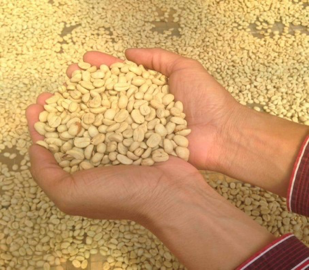Lam Dong, Vietnam – Lam Dong Province in the Central Highland region of Vietnam has a lot of potential because of its advantages in nature, climate, and land suitable for agricultural development. One of the crops grown in the area is coffee. Coffee farmers in Lam Dong have a lot of experience in growing coffee, however, they face problems on unsustainable production and consumption due to small scale production, unsynchronized processing storage, and lack of appropriate information on growing coffee.
Thus in 2016, several farmers in Nam Ban town, Lam Ha district established two groups of households under the sustainable-based 4C coffee development program. However, there was no strong linkage between production and consumption. The households looked for individual outputs mainly through local traders, being often subject to price constraints. The farmers knew how to produce coffee in accordance with the 4C sustainable coffee standards but when harvested, the price was only equal to ordinary coffee. Access to capital was also difficult. There was a need to link the input and output stages to ensure profit as well as the quality of products by forming cooperatives and cooperative groups.
Through the MTCP2 Programme as well as the engagement of local authority, coffee farmers in the province have been provided with capacity-building and knowledge on business planning, market research, marketing, and cooperative development; joined exchange visits to successful cooperatives and cooperative models in and outside the province; and linked with enterprises for production and business.
In July 2017, the two groups were transformed into cooperative groups—TuLiem-Thang Long and Chi Lang-Dong Anh, and set up operational regulations and assigned specific tasks to its members.
As a result, the awareness of members about the benefits of joining cooperative groups has significantly improved. From the initial five members of each group, there are now 110 coffee farmers in the cooperative groups farming a total area of ??200 hectares. The members have jointly made a business plan, shared experiences in coffee production in compliance with the international UTZ standards, and focused on sustainable production ensuring economic development along with environmental protection.
After the linking workshop with international businesses, UTZ, and support from MTCP2, the cooperative groups have been able to connect with the input suppliers and output companies. In particular, the households cooperated to buy fertilizer from the Binh Dien fertilizer company. In addition, Vinh Han company has committed to buying 1,000 tons of coffee per year with a bonus of 300 VND (.013 USD) per kilogram for coffee produced according to UTZ standards. This makes the farmers feel secure with their production as they can save input costs and get stable output, increasing their income and improving their living standards.
These outcomes were achieved through the good facilitation of farmer unions (FU) and the Viet Nam Farmers Union (VNFU) as the MTCP2 national implementing agency in Vietnam at all levels to provide capacity building on business and production skills and workshop on linkage with enterprises and relevant stakeholders. The provincial support fund for farmers and support from local authorities and enterprises also catalyzed these developments.
To achieve all these outcomes, there should be trust and cooperation among the community. It is also important to note the role of FU at all levels in actively supporting and linking farmers, cooperative groups enterprises, private sectors, scientists, authorities, and agencies. It is necessary to enhance the role of group leaders to actively manage, operate, and organize cooperative/cooperative groups.
Furthermore, there is a need to build and enhance the capacity of FU staff to help facilitate the cooperatives/cooperative groups. It is necessary to mobilize various resources to support the development of cooperative groups. Transforming farmer groups into cooperatives is needed to take full advantage of the support for cooperative groups. #
About MTCP2
The Medium-Term Cooperation Program Phase 2 (MTCP2), a five-year capacity building program supported by the International Fund for Agricultural Development (IFAD), the Swiss Agency for Development and Cooperation (SDC), and the European Union (EU) , has been implemented in 22 countries across three sub-regions—Southeast Asia (through the ASEAN Farmer Organization Support Program-AFOSP-MTCP2), South Asia, and the Pacific—engaging 86 national federations of farmers organizations with 1,628 sub-national farmers organizations (FOs) with a total membership of around 43.5 million small-scale women, men and young farmers. The funding support (12 million USD) served as a catalytic fund that allowed FOs to enhance their capacity to engage in policy dialogues and to be effective channels of economic services to farmers. The program has contributed to the formation of strong national platform of FOs with improved capacity to engage in constructive policy processes and mobilize resources from mainstream agricultural development programs like extension services, credit, and pre and post-harvest facilities. The program also helped in re-structuring farmers’ associations into community-based social enterprises or as commodity-based cooperatives as well as consolidating FOs into agricultural cooperative federations/union to strengthen the role of small-scale farmers within an inclusive and sustainable value-chain. The program is being implemented by the consortium Asian Farmers’ Association for Sustainable Rural Development (AFA) and La Via Campesina (LVC).




Comments are closed